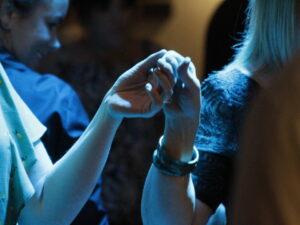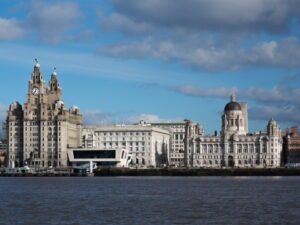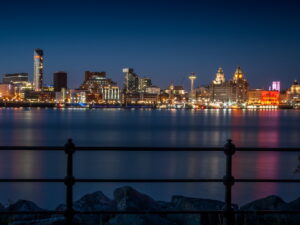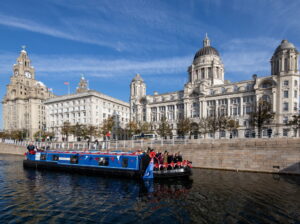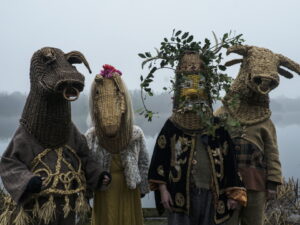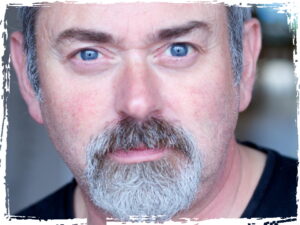
Stories are exchanges.
They connect people and histories, time and memory. They are at their best, when they are shared and explored; layered and unravelled, allowing for new meanings and exchanges.
In 2020, the Festival launched a Cultural Connectedness Exchange to help Irish and Northern Irish artists find representation in arts and cultural venues in England. We wanted to make friends and find artists we hadn’t worked with before. Cue Doug Devaney. Doug joined the group, shared his work –The Plastic Podcast – and here we are helping him tell his story and yours! How did it begin? What will happen next? Are you sitting comfortably? Then we’ll begin…
This year, Liverpool Irish Festival will host a resident recordist.
Three, two…
Doug Devaney (pictured) will roam the festival with a camera and microphone, giving you the chance to share your Irish stories. To collect more stories, Doug will hold “Duggie Drop Ins” during the Festival, in the Brahms Suite, at The Liverpool Philharmonic Dining Rooms (details below) if you fancy telling your tale over a drink in a relaxed lunchtime session. Doug’s recordings will combine to create a post-Festival premiere of The Mersey Mash (Tue 2 Nov 2021), shown to a live audience at the Liverpool Irish Centre and a film, also called The Mersey Mash, going out online with a special watch party on Thurs 11 Nov 2021.
As well as being an actor, writer and journalist; Doug is producer and presenter of The Plastic Podcasts, a series of interviews with members of the Irish diaspora, ranging from actor and activist Paddy O’Keefe (who came over from Killorglin one summer and never went back) to nursing legend Dame Elizabeth Anionwu (who can trace the Irish part of her Nigerian-Irish heritage back to the 1840s).
Doug is the son of Michael Devaney from County Clare, and Helen Lambourn from Reading, making him a second-generation Irish citizen, born in Britain. To some, that makes him a “Plastic Paddy”.
Terminology: “Plastic Paddy”
“I never quite understood that”, he says; “that somehow you’re less than authentic or ‘real’, simply because of where you have been born. It’s ironic that –of all the people in the world– it’s the sons and daughters of the migrant Irish that have this title, given how much the leaving of the island has become part of the Irish identity.
“Ten per cent of the country are second or third generation Irish and -up to very recently- we were supposed to keep our heads down. The biggest Irish band in the world? The Beatles!”.
It was Brexit -and the rush for Irish passports- that concentrated Doug’s mind on the question of his heritage. “The paperwork was straightforward enough. My dad being from Clare meant I was already an Irish citizen; it was just a matter of waiting. When my passport arrived, I compared it to my British one. Here were two almost identical documents, but one claimed my nationality was British, the other stated I was Irish. How could I be both? Or was I neither?”.
Lone voice or common call?
Doug started The Plastic Podcasts to see whether his own experience and feelings were unique or part of a broader tale. “It’s obvious when you think about it,” he says. “There’s at least ten per cent of the population entitled to an Irish passport. That’s more than six million people. Of course, their stories are going to be different, but at the same time we have so much in common”.
At first, he limited the podcasts to the generations he knew best: the influx of Irish migrants who moved from the late 50s and 60s onwards, and their sons, daughters and grandchildren. “It’s easy to think of their story as a straightforward immigrant tale; of a progression from the days of ‘No dogs. No blacks. No Irish’ and ‘Thick Mick’ gags to the days of ‘U2 cool’ and the passport with a harp being your last exit from Brexit” Doug continues.
“But it’s more than that. So much more. The tide of tale spills forwards and backwards. It’s the story of the rise of the mixed-race Irish; here and across the water. It’s the story of a nineteenth century Dubliner making his way to Liverpool, to the USA and finally to Burma, where he challenged the British Empire as a Buddhist monk! It’s the story of ‘Spitfire Paddy’ and republicans in Surrey. It’s the story of people unlearning their accents just to get a job. It’s about hostels and asylums, and poets and nurses, and builders and professors…
“It’s about how much the Irish in Britain have changed this country, and how much this country has changed us. And it’s not a story that’s over. The fact that Pontins had a blacklist of Irish surnames in order to prevent Irish Travellers from holidaying on their sites tells us this is far from a simple tale that’s come to an end.
“We all come from somewhere else; and we have gone to so many places. That’s what The Plastic Podcasts is about: recording those journeys. I can never get over how generous people are with their stories”.
The Mersey Mash
Liverpool has been a major part of those stories, both as a destination in England and as a jumping off point for those who crossed the Atlantic. It’s also a major part of Doug’s life, too. “I studied Drama and English up here –just outside of Huyton– in the 80s, back when John Moores University was still ‘The Poly’” he recalls. “It was the age of The Casablanca, The Las and tripping over Ian McCullough. I’ve got family and friends up here, so I’ve watched the city change over the decades.
“One thing that won’t change is Liverpool’s connection to Ireland. It shapes the city’s character; being in England, but not of England. There are thousands of Irish stories to be told here. I’m looking forward to hearing them and having the chance to share them in Liverpool. It’ll be like coming home”.
Doug will be our roving recordist across the Festival. Feel free to approach him with ideas for stories or to set up an interview with him. You can also contact him by email at [email protected] to arrange an interview in advance.
The Plastic Podcasts can be found at plasticpodcasts.com and on Amazon, Apple Podcasts and Spotify.

